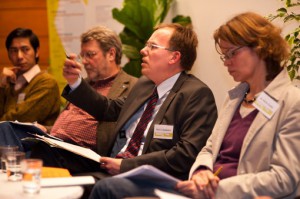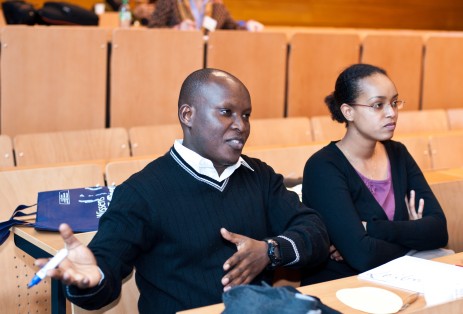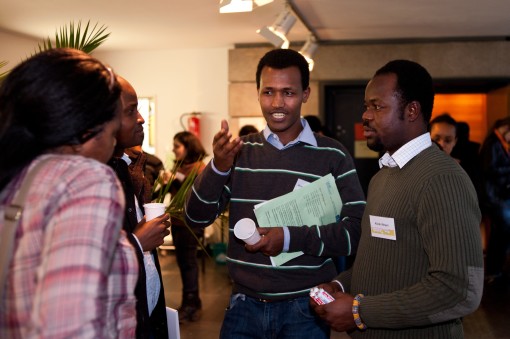Workshop in Hanover: Intense exchange between students and experts
No one should go hungry and food should be safe to eat. Fully committed to these goals, the international DAAD scholarship holders used the “Safe food for all – Food Safety & Food Security” workshop that was held in Hanover at the end of February to figure out how to achieve them. In the face of rapid population growth, the world needs more comprehensive solutions in the fight against hunger. The global market demands new strategies for ensuring food security. Four experts provided students with plenty of input and insights during the seventh stop of the Millennium Express.
“More than 70 per cent of Kenya’s people live in rural areas. They are poor and unemployed,” says Jackline Mworia of her home country. As the DAAD scholarship holder continues to explain, her country’s people must rely on what they themselves can produce, completely dependent on what they can farm from tiny, often drought-withered plots of land. She is currently enrolled in the DAAD-sponsored postgraduate course “International Horticulture” in Hanover and was one of the organisers of the workshop. “The way farming is carried out in the rural areas of my home country is neither efficient nor sustainable.” The Kenyan has made this her area of focus and is committed to introducing small farmers to more effective production methods. As she sees it, this means departing from large-scale and export-oriented monoculture and turning to small-scale farming employing modern methods. “We need to turn farming into an attractive business for individuals. This creates jobs,” says Jackline Mworia.
 Four experts were invited to take part in a public discussion. The agricultural economist from Göttingen, Professor Matin Qaim, pointed to the danger of Kenya’s rural population being forced into subsistence farming due to a failed market. According to Qaim, this predicament needs to be headed off by making sure the farmers are more involved in market developments. “This will trigger a change in culture,” stresses Qaim. But jobs won’t necessarily be in the agricultural sector.
Four experts were invited to take part in a public discussion. The agricultural economist from Göttingen, Professor Matin Qaim, pointed to the danger of Kenya’s rural population being forced into subsistence farming due to a failed market. According to Qaim, this predicament needs to be headed off by making sure the farmers are more involved in market developments. “This will trigger a change in culture,” stresses Qaim. But jobs won’t necessarily be in the agricultural sector.
Eco-friendly farming and genetically engineered plants?
Diverging perspectives among workshop participants kept the discussion interesting and lively. Professor Hans-Jörg Jacobsen, who heads the Plant Biotechnology Department at the Leibniz Universität Hannover, champions the use of genetically modified plants because they are not only more resistant but can adapt better to various soils and climates. Katrin Zander from the Johann Heinrich von Thünen Institute, the Federal Research Institute for Rural Areas, Forestry and Fisheries, sees things differently, supporting the use of ecological production processes to trigger higher yields. “Processes like these can make a substantial contribution to ensuring global food security,” says the agricultural economist. “This is in large part due to the fact that they are integrated into the ecological cycle and as such, require minimal input.” Those on stage had nothing against taking elements from both camps and combining them in modified versions to meet local needs.
 “How safe are genetically engineered plants?” This question was on the minds of many of the workshop participants, who had divided themselves into four groups in preparation for the podium discussion. Top issues besides ecological farming and economics included food security in combination with green genetic engineering. Referring to risk research, Hans-Jörg Jacobsen stressed that “nothing is without risk, but the use modified plants does not increase the amount of risk either.” He finds it unacceptable to deny their use for purely ideological reasons.
“How safe are genetically engineered plants?” This question was on the minds of many of the workshop participants, who had divided themselves into four groups in preparation for the podium discussion. Top issues besides ecological farming and economics included food security in combination with green genetic engineering. Referring to risk research, Hans-Jörg Jacobsen stressed that “nothing is without risk, but the use modified plants does not increase the amount of risk either.” He finds it unacceptable to deny their use for purely ideological reasons.
Worldwide standards nonexistent
Many questions concerning general food security were directed toward Professor Eberhard Haunhorst, President of the Lower Saxony State Office for Consumer Protection and Food Safety. Nishad Malla, who comes from Nepal, explains that in his country, the issue of food stretches far beyond questions of supply. “People want their food to be safe, free of contamination – and affordable at the same time. These are additional challenges.” Eberhard Haunhorst made it clear: “It is our duty to create a safe food supply for all.” Yes, but it is not something that can happen overnight. First comes the challenge of defining the terms. What exactly is meant by “safe” or “quality”? There is no one globally applicable answer. Secondly, there needs to be an effective and globally accepted monitoring system in place. “There’s still so much that has to be done in this area,” says Haunhorst. This was clear to the DAAD scholarship holders in attendance, who walked away from the workshop with fresh ideas and insights. For Matin Qaim, the very fact that international programmes devoted to these issues exist is reason enough for optimism. “Modern science can help. In the broades sense, this means science combined with local knowledge and technology.”






